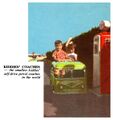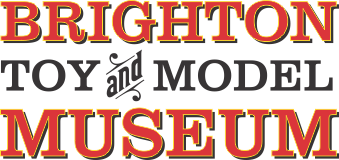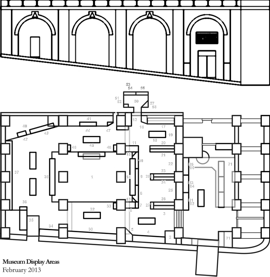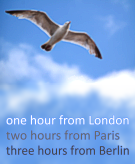Category:Johnstones Midget Coaches
~1961: "KIDDIES' COACHES – the smallest self-drive petrol coaches in the world" [image info]
1960: Article in the Evening Argus on the closure of Ernie Johnstone's attraction, newspaper cutting from the library of Tony Johnstone [image info]
Ernest Johnstone (better known as "Ernie Johnstone") built a range of miniature motorised rideable vehicles from 1935 to 1958. The vehicles included a few fire engines, but most were Southdown Buses single-decker coaches. Johnstone also supplied a number of chassis to the coachbuilders Harrington.
Johnstone's vehicles were beautifully made and detailed, and were popular at Peter Pan's Playground on Brighton seafront. Equipped with two-stroke motorcycle engines, the coaches had a top speed of 26mph, and as working petrol-engined vehicles, were licenced and could have numberplates attached for road use – at one point, Johnstone drove one the 250 miles from London to Wolverhampton.
Brighton Seafront
The miniature coaches had their own dedicated "track" on Brighton seafront in the shape of a special area with a miniature section of roadway complete with miniature signs and road markings in the shape of a "figure 8", with a central crossroads. Since the coaches didn't have side-doors, children were lifted in and out of the coaches by an attendant.
Other resorts
The miniature coach rides were very popular, and as Ernie built more coaches, other seaside resorts such as Margate and Morecambe ("The Brighton of the North") started buying them from Ernie to create their own similar attractions. Matthew Kerr of Kerr's Miniature Railway, in West Links Park Arbroath, Scotland bought a Johnstone coach in 1955, and currently still run a small fleet of two 1950s buses and a fire engine, presumably all "Johnstone"s. Eric Leyland of Morecambe bought a Johnstone coach (LUF 1) and fire engine in 1952 and operated them up until 1956.
Harringtons
The local company Thomas Harrington & Sons Ltd. of Old Shoreham Road, Hove, were a "coachbuilder" from 1897-1966, taking motorised chassis from major vehicle manufacturers and building their own specialised bodyshells tailored for the passenger transport market. Some of Ernie's miniature vehicles were replicas of Harrington coaches, and Harrington decided that this was such a good idea in terms of publicity that they bought a series of miniature chassis from Johnstone and built them up into full minature buses, as publicity display pieces.
Harrington built 12 miniature coaches on Johnstone chassis during 1949-50, and listed four types of coach as being available, A through D:
- "Type A. Harrington famous Dorsal Fin design, seating adult driver and two child passengers in front. Instead of a rear seat there is accomodation for light parcels and packages."
- "Type B (without fin). Accommodates adult driver, two child rear passengers in front and in addition two children on the seat at rear."
- "Type C. Pedal driven model instead of with motor power. Further information on request."
- "Type D. A smaller window Display Model, with fixed wheels and no transmission or motive power fitted with miniature seats. "
Rallies of Harrington-built coaches sometimes include examples of the Harrington/Johnstone miniatures buses.
External links
- Adam Trimingham tells us about a Brighton engineer and his famous miniature coaches (theargus.co.uk)
- Peter Pan's Playground: Johnstone's coaches in the 1940s, by Dennis Parrett (mybrightonandhove.org.uk)
- THE JOHNSTONE – HARRINGTON MINIATURE COACHES, Geoff and Linda Price collection, photo gallery (transtar-promotions.co.uk)
- Miniature Southdown coach EJ 1935 (flickr.com)
- The Lillywhite, Speed and Tomlinson Family Album (bygones.org.uk)
the Harrington coachwork hybrids
- The Harrington Miniature Coach (thcoachwork.co.uk)
- Amberley: 5th Harrington Gathering 2007 (stuarts-world-buses.smugmug.com)
- Thomas Harrington Ltd. (wikipedia.org)
Kerr's Miniature Railway
- Miniature vehicles, Kerr's Miniature Railway (kerrsminiaturerailway.co.uk)
- Kerr's Miniature Railway (wikipedia.org)
Brighton
Morecambe
film/video
- 1948 film of Ernie Johnstone driving one of his miniature buses, "HUF 16", along the Brighton seafront (britishpathe.com) – video
- Kerr's Miniature Railway Stagecoach Bus (youtube.com) – colour video
Pages in category ‘Johnstones Midget Coaches’
This category contains only the following page.
Media in category ‘Johnstones Midget Coaches’
The following 2 files are in this category, out of 2 total.
- Ernie Johnstones kiddies coaches (BHOG ~1961).jpg 1,128 × 1,200; 764 KB
- So Now Theres a Gap in Funland, Ernie Johnstone (EveningArgus 1960-12).jpg 2,200 × 1,508; 666 KB







